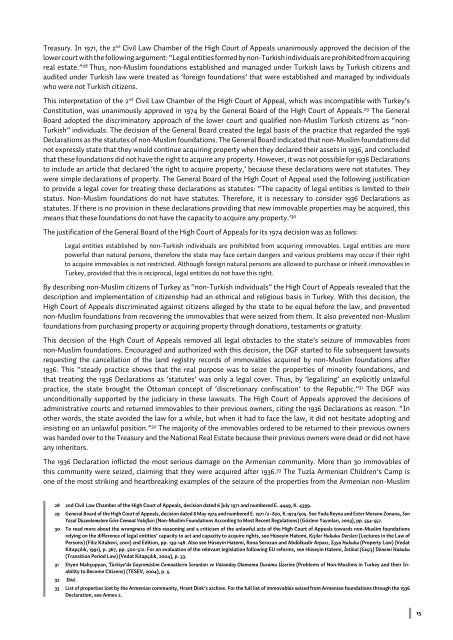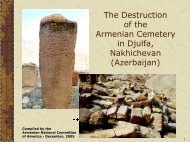The Story of an Alien(ation): - Tesev
The Story of an Alien(ation): - Tesev
The Story of an Alien(ation): - Tesev
You also want an ePaper? Increase the reach of your titles
YUMPU automatically turns print PDFs into web optimized ePapers that Google loves.
Treasury. In 1971, the 2 nd Civil Law Chamber <strong>of</strong> the High Court <strong>of</strong> Appeals un<strong>an</strong>imously approved the decision <strong>of</strong> the<br />
lower court with the following argument: “Legal entities formed by non-Turkish individuals are prohibited from acquiring<br />
real estate.” 28 Thus, non-Muslim found<strong>ation</strong>s established <strong>an</strong>d m<strong>an</strong>aged under Turkish laws by Turkish citizens <strong>an</strong>d<br />
audited under Turkish law were treated as ‘foreign found<strong>ation</strong>s’ that were established <strong>an</strong>d m<strong>an</strong>aged by individuals<br />
who were not Turkish citizens.<br />
This interpret<strong>ation</strong> <strong>of</strong> the 2 nd Civil Law Chamber <strong>of</strong> the High Court <strong>of</strong> Appeal, which was incompatible with Turkey’s<br />
Constitution, was un<strong>an</strong>imously approved in 1974 by the General Board <strong>of</strong> the High Court <strong>of</strong> Appeals. 29 <strong>The</strong> General<br />
Board adopted the discriminatory approach <strong>of</strong> the lower court <strong>an</strong>d qualified non-Muslim Turkish citizens as “non-<br />
Turkish” individuals. <strong>The</strong> decision <strong>of</strong> the General Board created the legal basis <strong>of</strong> the practice that regarded the 1936<br />
Declar<strong>ation</strong>s as the statutes <strong>of</strong> non-Muslim found<strong>ation</strong>s. <strong>The</strong> General Board indicated that non-Muslim found<strong>ation</strong>s did<br />
not expressly state that they would continue acquiring property when they declared their assets in 1936, <strong>an</strong>d concluded<br />
that these found<strong>ation</strong>s did not have the right to acquire <strong>an</strong>y property. However, it was not possible for 1936 Declar<strong>ation</strong>s<br />
to include <strong>an</strong> article that declared ‘the right to acquire property,’ because these declar<strong>ation</strong>s were not statutes. <strong>The</strong>y<br />
were simple declar<strong>ation</strong>s <strong>of</strong> property. <strong>The</strong> General Board <strong>of</strong> the High Court <strong>of</strong> Appeal used the following justific<strong>ation</strong><br />
to provide a legal cover for treating these declar<strong>ation</strong>s as statutes: “<strong>The</strong> capacity <strong>of</strong> legal entities is limited to their<br />
status. Non-Muslim found<strong>ation</strong>s do not have statutes. <strong>The</strong>refore, it is necessary to consider 1936 Declar<strong>ation</strong>s as<br />
statutes. If there is no provision in these declar<strong>ation</strong>s providing that new immovable properties may be acquired, this<br />
me<strong>an</strong>s that these found<strong>ation</strong>s do not have the capacity to acquire <strong>an</strong>y property.’ 30<br />
<strong>The</strong> justific<strong>ation</strong> <strong>of</strong> the General Board <strong>of</strong> the High Court <strong>of</strong> Appeals for its 1974 decision was as follows:<br />
Legal entities established by non-Turkish individuals are prohibited from acquiring immovables. Legal entities are more<br />
powerful th<strong>an</strong> natural persons, therefore the state may face certain d<strong>an</strong>gers <strong>an</strong>d various problems may occur if their right<br />
to acquire immovables is not restricted. Although foreign natural persons are allowed to purchase or inherit immovables in<br />
Turkey, provided that this is reciprocal, legal entities do not have this right.<br />
By describing non-Muslim citizens <strong>of</strong> Turkey as “non-Turkish individuals” the High Court <strong>of</strong> Appeals revealed that the<br />
description <strong>an</strong>d implement<strong>ation</strong> <strong>of</strong> citizenship had <strong>an</strong> ethnical <strong>an</strong>d religious basis in Turkey. With this decision, the<br />
High Court <strong>of</strong> Appeals discriminated against citizens alleged by the state to be equal before the law, <strong>an</strong>d prevented<br />
non-Muslim found<strong>ation</strong>s from recovering the immovables that were seized from them. It also prevented non-Muslim<br />
found<strong>ation</strong>s from purchasing property or acquiring property through don<strong>ation</strong>s, testaments or gratuity.<br />
This decision <strong>of</strong> the High Court <strong>of</strong> Appeals removed all legal obstacles to the state’s seizure <strong>of</strong> immovables from<br />
non-Muslim found<strong>ation</strong>s. Encouraged <strong>an</strong>d authorized with this decision, the DGF started to file subsequent lawsuits<br />
requesting the c<strong>an</strong>cell<strong>ation</strong> <strong>of</strong> the l<strong>an</strong>d registry records <strong>of</strong> immovables acquired by non-Muslim found<strong>ation</strong>s after<br />
1936. This “steady practice shows that the real purpose was to seize the properties <strong>of</strong> minority found<strong>ation</strong>s, <strong>an</strong>d<br />
that treating the 1936 Declar<strong>ation</strong>s as ‘statutes’ was only a legal cover. Thus, by ‘legalizing’ <strong>an</strong> explicitly unlawful<br />
practice, the state brought the Ottom<strong>an</strong> concept <strong>of</strong> ‘discretionary confisc<strong>ation</strong>’ to the Republic.” 31 <strong>The</strong> DGF was<br />
unconditionally supported by the judiciary in these lawsuits. <strong>The</strong> High Court <strong>of</strong> Appeals approved the decisions <strong>of</strong><br />
administrative courts <strong>an</strong>d returned immovables to their previous owners, citing the 1936 Declar<strong>ation</strong>s as reason. “In<br />
other words, the state avoided the law for a while, but when it had to face the law, it did not hesitate adopting <strong>an</strong>d<br />
insisting on <strong>an</strong> unlawful position.” 32 <strong>The</strong> majority <strong>of</strong> the immovables ordered to be returned to their previous owners<br />
was h<strong>an</strong>ded over to the Treasury <strong>an</strong>d the N<strong>ation</strong>al Real Estate because their previous owners were dead or did not have<br />
<strong>an</strong>y inheritors.<br />
<strong>The</strong> 1936 Declar<strong>ation</strong> inflicted the most serious damage on the Armeni<strong>an</strong> community. More th<strong>an</strong> 30 immovables <strong>of</strong><br />
this community were seized, claiming that they were acquired after 1936. 33 <strong>The</strong> Tuzla Armeni<strong>an</strong> Children’s Camp is<br />
one <strong>of</strong> the most striking <strong>an</strong>d heartbreaking examples <strong>of</strong> the seizure <strong>of</strong> the properties from the Armeni<strong>an</strong> non-Muslim<br />
28 2nd Civil Law Chamber <strong>of</strong> the High Court <strong>of</strong> Appeals, decision dated 6 July 1971 <strong>an</strong>d numbered E. 4449, K. 4399.<br />
29 General Board <strong>of</strong> the High Court <strong>of</strong> Appeals, decision dated 8 May 1974 <strong>an</strong>d numbered E. 1971 /2–820, K.1974/505. See Yuda Reyna <strong>an</strong>d Ester Moreno Zon<strong>an</strong>a, Son<br />
Yasal Düzenlemelere Göre Cemaat Vakıfları (Non-Muslim Found<strong>ation</strong>s According to Most Recent Regul<strong>ation</strong>s) (Gözlem Yayınları, 2003), pp. 554-557.<br />
30 To read more about the wrongness <strong>of</strong> this reasoning <strong>an</strong>d a criticism <strong>of</strong> the unlawful acts <strong>of</strong> the High Court <strong>of</strong> Appeals towards non-Muslim found<strong>ation</strong>s<br />
relying on the difference <strong>of</strong> legal entities’ capacity to act <strong>an</strong>d capacity to acquire rights, see Hüseyin Hatemi, Kişiler Hukuku Dersleri (Lectures in the Law <strong>of</strong><br />
Persons) (Filiz Kitabevi, 2001) 2nd Edition, pp. 139-148. Also see Hüseyin Hatemi, Rona Seroz<strong>an</strong> <strong>an</strong>d Abdülkadir Arpacı, Eşya Hukuku (Property Law) (Vedat<br />
Kitapçılık, 1991), p. 367, pp. 500-512. For <strong>an</strong> evalu<strong>ation</strong> <strong>of</strong> the relev<strong>an</strong>t legisl<strong>ation</strong> following EU reforms, see Hüseyin Hatemi, İntikal (Geçiş) Dönemi Hukuku<br />
(Tr<strong>an</strong>sition Period Law) (Vedat Kitapçılık, 2004), p. 33.<br />
31 Etyen Mahçupy<strong>an</strong>, Türkiye’de Gayrımüslim Cemaatlerin Sorunları ve Vat<strong>an</strong>daş Olamama Durumu Üzerine (Problems <strong>of</strong> Non-Muslims in Turkey <strong>an</strong>d their Inability<br />
to Become Citizens) (TESEV, 2004), p. 5.<br />
32 Ibid.<br />
33 List <strong>of</strong> properties lost by the Armeni<strong>an</strong> community, Hr<strong>an</strong>t Dink’s archive. For the full list <strong>of</strong> immovables seized from Armeni<strong>an</strong> found<strong>ation</strong>s through the 1936<br />
Declar<strong>ation</strong>, see Annex 2.<br />
15



